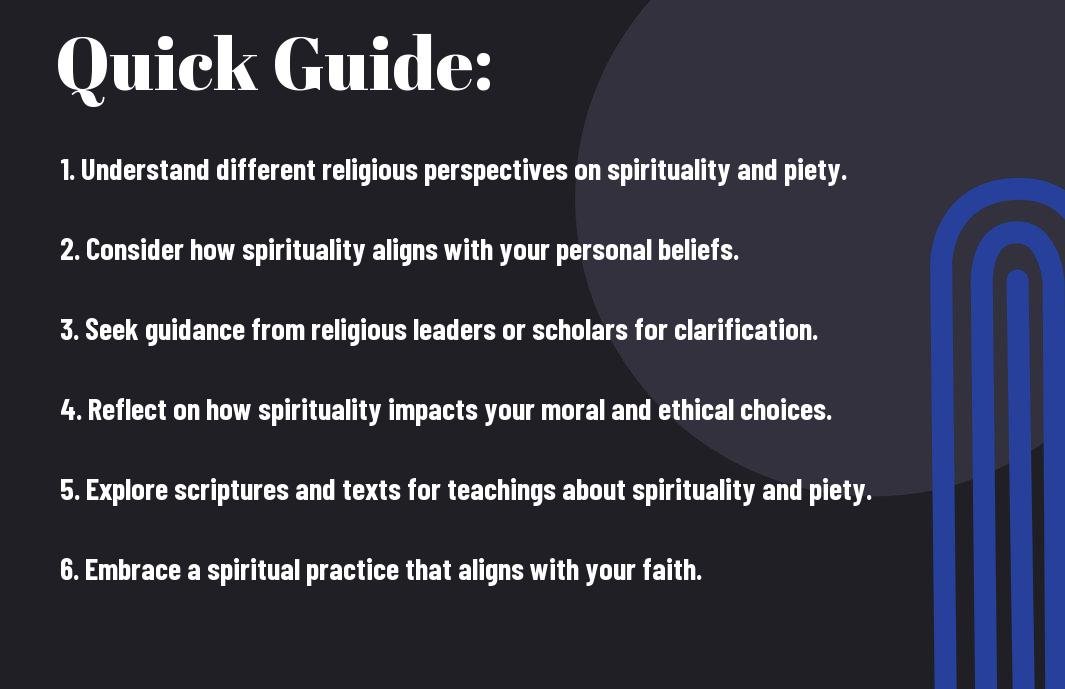Perplexed by the notion of spirituality being sinful? In this guide, I will delve into the complex and often controversial topic of spirituality and piety in the context of various religious views. I will explore the dangerous misconceptions surrounding spirituality and shed light on the positive aspects of leading a spiritual life according to religious doctrines. Whether you’re seeking clarity on your own spiritual journey or simply curious about the different perspectives on this matter, this guide will offer you insights and understanding on the importance of spirituality in various religious traditions.
Key Takeaways:
- Spirituality and piety are not inherently sinful: Many religious views emphasize the importance of spiritual practices and piety as a way to connect with a higher power.
- Interpretations of spirituality can vary: Different religious traditions may have varying views on what constitutes spirituality and how it should be practiced.
- Misguided or extreme spirituality can be considered sinful: Some religious perspectives caution against excessive or misguided spiritual practices that deviate from the core teachings of the faith.
- Balance and moderation are key: Many religious viewpoints stress the importance of balancing spiritual pursuits with ethical actions and responsibilities in the material world.
- Individual introspection and guidance are crucial: Understanding one’s own beliefs and seeking guidance from religious authorities can help individuals navigate the complex relationship between spirituality and sin.
Understanding Religious Views on Spirituality and Piety
To truly understand the concept of spirituality and piety, it is essential to delve into the religious views on these matters. Each religion has its own perspective on what it means to be spiritual and pious, and how one can achieve these states. Understanding these views can help us grasp the diverse and complex nature of spirituality across different faiths.
Types of Spiritual Practices within Different Religions
In various religions, there are different types of spiritual practices that are upheld as sacred and essential for fostering a deeper connection with the divine. For example, in Christianity, prayer, attending church services, and participating in the sacraments are considered essential spiritual practices. In Islam, the Five Pillars, including daily prayers, fasting during Ramadan, and pilgrimage to Mecca, are central to spiritual life. Similarly, in Hinduism, yoga, meditation, and ritual worship are fundamental spiritual practices. Buddhism emphasizes mindfulness, meditation, and ethical conduct as central to spiritual development. Perceiving these variations in spiritual practices can help us appreciate the richness and diversity of religious traditions.
| Christianity | Prayer, attending church services, participating in the sacraments |
| Islam | Daily prayers, fasting during Ramadan, pilgrimage to Mecca |
| Hinduism | Yoga, meditation, ritual worship |
| Buddhism | Mindfulness, meditation, ethical conduct |
Tips for Incorporating Spirituality into Daily Life
Any individual, regardless of their religious beliefs, can incorporate spirituality into their daily life. Engaging in regular meditation or mindfulness practices, spending time in nature, and exploring personal values and beliefs can facilitate a deeper connection with the spiritual realm. Engaging in acts of kindness and compassion, practicing gratitude, and seeking guidance from spiritual leaders or mentors can also enrich one’s spiritual life. Any effort to nurture the soul and cultivate awareness can contribute to a more spiritually fulfilling existence.
Exploring the Factors Influencing Religious Perspectives on Spirituality
Obviously, religious perspectives on spirituality are deeply influenced by a variety of factors, including cultural traditions, doctrinal teachings, and historical contexts. Additionally, the interpretation of sacred texts and the guidance of religious leaders play a significant role in shaping how different faiths view spiritual practices. In some cases, the level of tolerance toward other religious perspectives and practices can impact how spirituality is understood within a particular belief system. It’s important to consider these factors when exploring the diverse views on spirituality within various religions.
- Cultural traditions
- Doctrinal teachings
- Historical contexts
- Sacred texts interpretation
- Religious leadership guidance
- Tolerance toward other religious perspectives
Assume that these factors can significantly shape the way individuals within a particular religious community approach and understand spirituality.
Step-by-Step Approaches to Deepening Spiritual Connection
When deepening your spiritual connection, it’s important to approach the process intentionally and methodically. Here is a step-by-step guide to help you on your journey:
| Steps to Deepen Spiritual Connection | Description |
| 1. Reflect on your beliefs | Take time to contemplate and understand your own beliefs and values. |
| 2. Practice mindfulness | Engage in activities that promote self-awareness and being present in the moment. |
| 3. Seek spiritual guidance | Consult with religious leaders or mentors for advice and support. |
| 4. Engage in spiritual practices | Participate in rituals or traditions that are meaningful to you and your faith. |
| 5. Foster a sense of community | Connect with like-minded individuals to share and learn from each other’s experiences. |
Pros and Cons of Embracing Spiritual Practices from a Religious Perspective
Embracing spiritual practices from a religious perspective can have both positive and negative aspects. Here are some of the pros and cons to consider:
| Pros | Cons |
| 1. Deepened sense of meaning and purpose | 1. Potential for dogmatism and closed-mindedness |
| 2. Built-in support system | 2. Pressure to conform to religious norms |
| 3. Opportunities for spiritual growth and development | 3. Conflict with non-religious individuals |
| 4. Connection to a rich historical and cultural tradition | 4. Potential for judgment and discrimination |
| 5. Sense of belonging and community | 5. Overemphasis on rituals and traditions |

Is Being Spiritual a Sin – Understanding Religious Views on Spirituality and Piety
From above discussion, it is clear that the concept of spirituality and piety varies greatly among different religious traditions. While some may view spiritual practices as a way to connect with the divine and deepen one’s faith, others may see it as a hindrance to true religious piety. It is important to recognize and respect the diverse beliefs and interpretations of spirituality within different faith traditions. Ultimately, the question of whether being spiritual is a sin or not can only be answered through individual reflection, guided by one’s own religious beliefs and values.
FAQ
Q: Is being spiritual a sin according to religious views?
A: While different religions have varying viewpoints, the general consensus is that being spiritual is not a sin. Being spiritual is often encouraged as a means of deepening one’s faith and connection to a higher power.
Q: What does spirituality mean in the context of different religions?
A: Spirituality in the context of different religions often refers to the belief in a higher power, connection to the divine, and the practice of virtues such as compassion, gratitude, and humility. It is a means of seeking a deeper understanding of the universe and one’s place within it.
Q: How does spirituality differ from piety in religious beliefs?
A: Spirituality is often seen as an individual’s personal journey towards connection with the divine, while piety is the outward expression of one’s religious devotion through acts of worship, prayer, and adherence to religious teachings and traditions.
Q: Are there any religious teachings that view spirituality as a sin?
A: In general, no major religious teachings view spirituality as a sin. However, there may be fringe interpretations within certain sects or denominations that may hold such views. It’s important to consult authoritative sources within each religion for accurate information.
Q: How can one balance spirituality and piety within their religious beliefs?
A: Balancing spirituality and piety involves cultivating a personal relationship with a higher power while also engaging in the prescribed religious practices and rituals of one’s faith. It may involve seeking guidance from spiritual leaders and engaging in contemplative practices to deepen one’s understanding of their faith.











